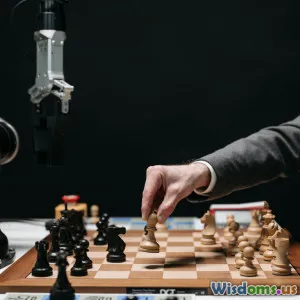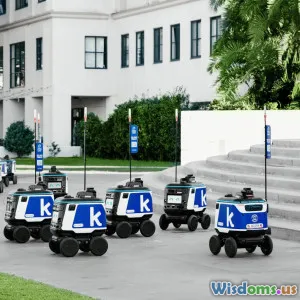
AI and the Future of Work: What to Expect
7 min read Explore how AI is reshaping work with automation, new roles, and skills for the future workforce. (0 Reviews)
AI and the Future of Work: What to Expect
Introduction
Artificial Intelligence (AI) is no longer a futuristic concept limited to science fiction. It is a transformative force already reshaping how we work, communicate, and perform everyday tasks. From self-driving cars to voice assistants, AI is integrating deeply into our professional lives. But what exactly does this mean for the future of work? Will AI replace jobs, or will it create new opportunities? How should employees and organizations prepare for this new era?
This article explores the evolving landscape of AI and automation in the workplace. Drawing from current data, expert insights, and emerging trends, we uncover what to expect in terms of job transformation, skill requirements, workplace dynamics, and economic impact.
The Current Landscape: Automation in Action
AI and automation technologies are already embedded in many industries. For instance, financial firms use algorithmic trading bots to analyze market trends faster than humans. Manufacturing plants deploy robots for repetitive tasks — enhancing efficiency and safety. According to the McKinsey Global Institute, about 15% of the global workforce’s hours (equivalent to more than 400 million jobs) could be automated by 2030.
Take Amazon’s warehouses as an example. They combine human labor with automated guided vehicles (AGVs) and AI-driven inventory management systems to optimize logistics. This layered approach increases productivity but also changes the nature of work from purely manual tasks to supervising and managing automated systems.
This blurring of responsibilities showcases a critical trend: AI will often augment human work rather than wholly replace it, pivoting employees toward high-value activities like problem-solving, creativity, and interpersonal communication.
The Dual Impact: Job Displacement and Job Creation
Job Displacement: What’s at Risk?
There’s no denying AI and automation will disrupt certain roles. Routine and repetitive tasks, especially in sectors like data entry, manufacturing, and customer service, face higher automation potential. For example, chatbots now effectively handle many routine customer queries, reducing the need for large call center teams.
However, job displacement varies by region, economic sector, and technology adoption speed. A 2020 report by the World Economic Forum projected that while 85 million jobs may be displaced by automation by 2025, about 97 million new roles could emerge, creating a net positive effect on employment.
Job Creation: New Opportunities on the Horizon
New job categories linked with AI and automation are rapidly developing. These include AI specialists, data analysts, robot maintenance technicians, and ethicists who ensure AI’s responsible use.
Consider the rise of roles in data science. In 2021, LinkedIn identified data science and AI-related roles among the fastest-growing jobs globally. Companies value professionals who can interpret vast AI-generated datasets to make actionable business decisions.
Moreover, creative and interpersonal roles such as counselors, team coaches, and innovation managers are in demand, underlining that human-centric skills remain vital.
Key Skills for the Future Workforce
Adapting to the AI-driven workplace requires a shift in skill sets. Experts emphasize a combination of technical, cognitive, and social skills:
-
Technical skills: While not everyone needs to become an AI engineer, familiarity with digital tools, data literacy, and understanding AI capabilities are increasingly important.
-
Cognitive skills: Critical thinking, complex problem-solving, and creativity are irreplaceable by machines and thus highly valued.
-
Social and emotional intelligence: Skills such as empathy, teamwork, and communication will rise in importance since AI cannot replicate genuine human connections.
Educational institutions and employers are taking note. For example, PwC runs training initiatives to upskill employees on digital technologies and critical thinking to ease workforce transitions.
Changing Work Culture and Organizational Structure
AI introduces more than new tasks; it redefines how work gets done. With automation handling routine operations, humans focus on oversight, strategic planning, and innovation.
Hybrid human-AI collaboration is becoming commonplace. Project management tools now integrate AI predictions about timelines and risks, augmenting, not replacing, human decision-making.
Organizations are also adopting more flexible work modes enabled by AI-powered remote collaboration platforms. The 2023 Global Workplace Analytics report found a 44% increase in remote work adoption, facilitated by AI tools like virtual assistants, smart scheduling, and AI-driven knowledge management.
This cultural shift demands adaptable leadership styles, open communication channels, and continuous learning cultures to thrive.
Ethical Considerations and Economic Impact
AI’s workplace influence also raises ethical and economic questions. Issues around data privacy, algorithmic bias, and surveillance must be addressed proactively.
Economically, while AI may exacerbate inequality initially—benefiting capital owners and highly skilled workers—the right policies could steer the benefits broadly. Initiatives like universal basic income discussions and lifelong learning funds are gaining ground in many countries.
Government, industry, and academia must collaborate to craft regulations, ethical frameworks, and social safety nets that sustainably manage AI transitions.
Conclusion: Embracing the AI-Enabled Future
Artificial Intelligence will unquestionably transform the future of work—albeit as both a challenge and an opportunity. Anticipating these changes allows workers, companies, and policymakers to stay ahead.
The key lies in embracing continuous learning, fostering human-AI collaboration, and promoting policies that ensure equitable benefits. Rather than fearing job loss, we should focus on leveraging AI to enhance human creativity, decision-making, and productivity.
The future workforce will not simply be about working alongside machines but working smarter, fueled by AI’s transformative potential.
Rate the Post
User Reviews
Popular Posts





















